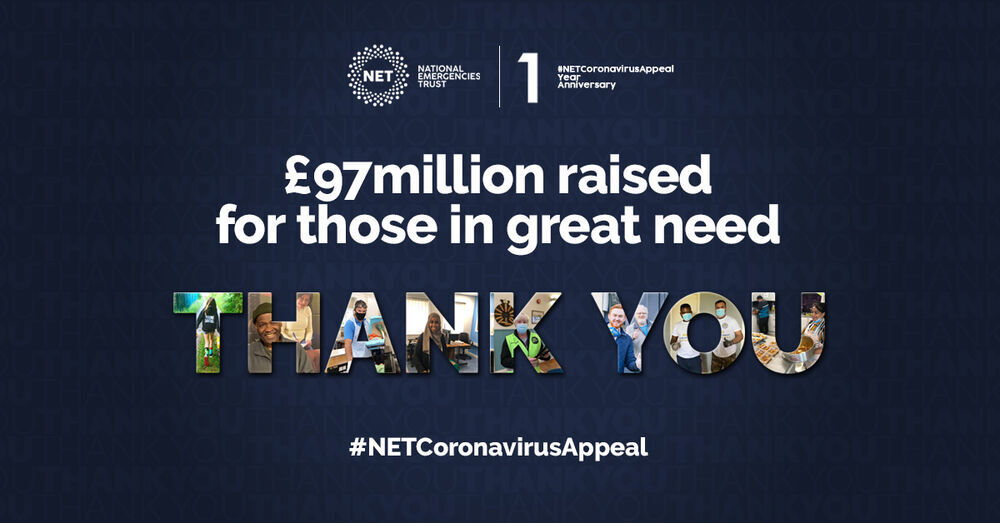An emergency Coronavirus Appeal backed by His Royal Highness The Duke of Cambridge has raised nearly £100million for UK charities since its launch a year ago, and more than £3.5million of this has reached the Foundation, supporting grassroots charities and groups across the West Midlands and Warwickshire.
The National Emergencies Trust’s Coronavirus Appeal, which launched in March 2020, has raised more than £97million for people affected by the pandemic and £94million of this has already funded 13,000+ charitable projects across the four nations.
In the West Midlands, 660 grassroots charities and groups have received grants from the Coronavirus Appeal through the Foundation to enable them to respond to urgent needs created by the pandemic.
Charities such as Sandwell African Women Association who support African refugee women and children affected by wars, sexual violence, exploitation and abuse. The group provides advice, support and training to disadvantaged African women refugees and children from Sandwell, Birmingham, Walsall, Dudley and Wolverhampton.
Sandwell African Women Association used a Coronavirus Appeal grant through the Foundation to provide emergency support to those who were socially isolated and vulnerable elderly women from the African community, delivering essential food, toiletries and basic necessities.
General The Lord Richard Dannatt, Chair of the National Emergencies Trust, said:
“In an incredibly challenging year, the public, UK businesses, and charitable trusts and foundations have come together to raise incredible sums of money for those in need. They have already helped to fund numerous projects in the West Midlands that have, quite simply, changed lives.
“The creativity and tenacity that local charities and groups like Sandwell African Women Association have shown in the last 12 months has also been a privilege to witness. When the world stopped, they started. Delivering food to the doorsteps of those shielding, transferring vital support services online and conceiving all manner of ways to bring communities together, from Zoom Zumba to virtual choirs.
“And of course, their work is not over yet. Though the vaccine roll-out rumbles on at pace, the sector will need to continue to respond to the economic and wellbeing impacts of this pandemic for a long time to come.”
To-date, around a third (32%) of Coronavirus Appeal funding distributed through community foundations has ensured that food and vital essentials reach those who need them. Nearly a quarter (23%) has helped to support people’s mental health and wellbeing through lockdowns. While 10% has enabled local charities to offer services to reduce social isolation
A further £16.6million of the £97million raised has been distributed through ten national charity partners, each one helping to ensure that funds reach groups with particular, unmet needs. These include: Age UK, Barnado’s, Comic Relief, Cruse Bereavement Care, DPO Covid-19 Coalition led by DIsability Action NI, Heads Together, the LGBT+ Consortium, Refuge, Shelter and The Refugee Council.
Tina Costello, Chief Executive of the Foundation, said:
“Without NETs Coronavirus Appeal I do not know how we would have supported the needs of the West Midlands. Thankfully, the Foundation has been able to provide a vital lifeline to grassroots organisations doing incredible work in our community. Thank you to NET, the groups we work with and everyone who has contributed to this amazing effort.”
The National Emergencies Trust was launched in November 2019, just four months before it activated its Coronavirus Appeal, to provide the UK with one trusted place to give during domestic disasters. It collaborates with charities and other bodies across the UK to ensure that emergency funding reaches those in need as fast, and as fairly, as possible.
Mhairi Sharp, CEO of the National Emergencies Trust, said:
“We didn’t expect that our first emergency appeal would be for a global pandemic, but this past year has proven not only that our model works, but how quickly the nation steps up in times of great need. The speed and scale of donors’ generosity, meant charities across the UK started to receive funding from the Appeal within a week, enabling them to offer vital support and services just as the first national lockdown started.”

